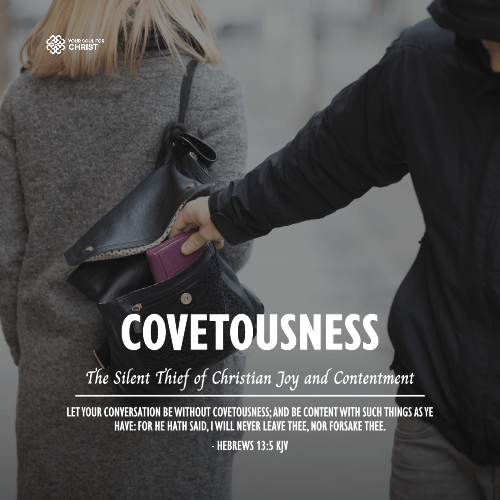Let your conversation be without covetousness; and be content with such things as ye have: for he hath said, I will never leave thee, nor forsake thee.
Hebrews 13:5 KJV
The term “conversation” in this context refers not just to verbal communication but to one’s entire way of life. To be “without covetousness” means avoiding greed or an excessive desire for something. Many of us still struggle with our wants, often neglecting to thank God for what we already possess. It’s easy to become consumed by our needs and desires, always asking for more. However, this verse encourages us to cultivate an attitude of contentment.
Covetousness reflects a discontented heart and a lack of trust in God’s provision. Meanwhile, contentment involves finding satisfaction in what we already have and trusting God to provide sufficiently for our needs. It’s a call to appreciate our current blessings rather than constantly longing for more out of greed.
Can you find contentment in what you have and let go of the anxiety over what you lack? As Philippians 4:6 NIV says: “Do not be anxious about anything, but in every situation, by prayer and petition, with thanksgiving, present your requests to God.” Similarly, Jesus encourages His followers not to worry about material needs. He emphasises that God is fully aware of our needs and will provide for them.
Therefore take no thought, saying, What shall we eat? or, What shall we drink? or, Wherewithal shall we be clothed? (For after all these things do the Gentiles seek:) for your heavenly Father knoweth that ye have need of all these things. But seek ye first the kingdom of God, and his righteousness; and all these things shall be added unto you.
Matthew 6:31-33 KJV
Consider the life of the Apostle Paul, who, in Philippians 4:11-13, speaks of his contentment in all circumstances. He illustrates that contentment does not depend on external circumstances but on trust and reliance on Christ. He learned to be content in both abundance and scarcity, following Christ’s example. Did you ever see Christ worrying or being anxious about anything? Of course not, because He had full assurance that God was always with Him.
In conclusion, godliness with contentment is indeed a great gain. As 1 Timothy 6:7-8 reminds us: “For we brought nothing into this world, and it is certain we can carry nothing out. And having food and raiment let us be therewith content.”
Can you shift your focus from greed and anxiety to trusting in God’s faithfulness and care? True contentment and peace come not from accumulating wealth or satisfying worldly desires but from trusting in God’s promises and being grateful for what we have. By embracing this mindset, we can experience the security and peace that come from knowing that God will never leave or forsake us, allowing us to live with contentment and joy in all circumstances.
